- Home
- Michael Bond
Monsieur Pamplemousse and the Carbon Footprint
Monsieur Pamplemousse and the Carbon Footprint Read online
Monsieur Pamplemousse and the Carbon Footprint
MICHAEL BOND
Contents
Title Page
CHAPTER ONE
CHAPTER TWO
CHAPTER THREE
CHAPTER FOUR
CHAPTER FIVE
CHAPTER SIX
CHAPTER SEVEN
CHAPTER EIGHT
CHAPTER NINE
CHAPTER TEN
CHAPTER ELEVEN
Advertisement
About the Author
By Michael Bond
Copyright
Monsieur Pamplemousse and the Carbon Footprint
CHAPTER ONE
Véronique put a finger to her lips before gently opening the door. ‘If I were you,’ she whispered, ‘I would keep it low key. We’re a bit edgy today …’
Murmuring his thanks, Monsieur Pamplemousse signalled Pommes Frites to follow on behind as they tiptoed past the Director’s secretary into the Holy of Holies.
Glancing quickly round the room, he seated himself in a chair standing ready and waiting opposite Monsieur Leclercq’s vast desk. Pommes Frites, meanwhile, hastened to make himself comfortable on the deep pile carpet at his feet.
Clearly, Véronique had not been exaggerating. All the signs suggested that if anything she was understating the situation.
Normally a model of sartorial elegance, the Head of France’s premier gastronomic guide looked in a sorry state; his Marcel Lassance tie hung loose around his neck, the jacket of his André Bardot suit was draped higgledy-piggledy over the back of a chair, and although one sleeve of the Eglé bespoke shirt was neatly rolled back above his elbow, the other looked as though it might have been involved in a close encounter with a lawnmower … perhaps while adjusting the blades, although that was highly improbable.
Unlike the past President of France, Monsieur Jacques Chirac, who was credited with having once operated a forklift truck in an American brewery following a spell at Harvard University, Monsieur Pamplemousse doubted if the Director had ever got his hands dirty in the whole of his life. The generally accepted opinion was that he probably laid out the ground rules at an early age; demonstrating clearly to all and sundry that even such mundane tasks as changing a typewriter ribbon were beyond his powers, making sure that letters dictated during the course of the day arrived without fail on his desk ready for signing at the appointed time that same afternoon. The licking of envelopes would have been someone else’s responsibility, thus allowing his taste buds to remain unsullied by close contact with gum mucilage.
Discretion being the better part of valour, it was probably far better to hold his fire until a suitable moment arose. After what seemed like an eternity, and aware of a certain restiveness at his feet, he could stand it no longer.
‘You sent for us, Monsieur?’ he ventured.
‘Yes, yes, Pamplemousse,’ said the Director distantly. ‘But it was you I wished to have words with first of all.’
Pausing as he riffled through the pile of papers, he glanced pointedly at the figure on the floor.
‘Would you prefer it if Pommes Frites waited outside?’ asked Monsieur Pamplemousse.
‘No, no,’ said Monsieur Leclercq gruffly. ‘It’s just that … well, to put it bluntly, Aristide, you are rather earlier than I expected and I have important matters to discuss. My mind is in turmoil and it is hard to concentrate when your every move is subject to scrutiny by two pairs of eyes rather than one.’
Ever sensitive to the prevailing atmosphere, and sufficiently conversant with the use of certain key words, Pommes Frites settled down again and, with his tail at half-mast, pretended to busy himself with his ablutions, although clearly his heart wasn’t in it.
‘Your message sounded urgent,’ said Monsieur Pamplemousse. ‘That being the case, we came as quickly as we could. It just so happened the traffic lights were green all the way. Such a thing has never happened before.’
‘Aaah!’ His words fell on deaf ears as an exclamation from the Director indicated he had at long last found what he had been looking for.
He waved aloft a crumpled form between thumb and forefinger. ‘As you will doubtless remember, Pamplemousse, I recently issued a questionnaire to all members of staff.
‘I had in mind ascertaining their views on various matters of importance. It was all part of an exercise in reappraising our current position in this difficult world of ours. Running an operation the size of Le Guide is a costly exercise, and from time to time, in common with most large companies, we have to take stock of the most expensive item of all: namely, manpower. It was our accountants who first posed the question. Are we, they asked, always getting value for money from those who work in the field?’
Monsieur Pamplemousse essayed a non-committal response, wondering what could possibly be coming next and fearing the worst.
‘Cast your mind back,’ continued the Director, ‘and you may also recall the very first question on the list.’
‘As a member of France’s premier food guide, what are the three things uppermost in your mind at all times?’ said Monsieur Pamplemousse.
In spite of himself, the Director looked impressed. ‘That is correct, Pamplemousse. Which makes your answer, “Sex, money, and still more sex,” singularly disappointing, even by present day standards.’
Monsieur Pamplemousse gave a start. ‘But …’ half rising from his chair, he held out a free hand, ‘may I see that form, Monsieur?’
The Director smoothed the piece of paper carefully on a blotting pad before handing it over. ‘I must confess, I was so incensed by your answer I screwed it into a ball and threw it into the waste bin. Unfortunately, my hand was trembling so I missed the target and it landed in a vase of flowers. The cleaning lady retrieved it for me later that day and left it on my desk to dry.’
‘Where would we be without the cleaning ladies of this world?’ mused Monsieur Pamplemousse, sinking back into his chair. ‘Hortense is a treasure and no mistake.’
‘Is that her name?’ said Monsieur Leclercq. ‘I had no idea.’
‘Speaking from experience,’ continued Monsieur Pamplemousse, savouring a minor victory, ‘I venture to suggest the answer which so upset you probably reflects the view of the vast majority of the French population, the younger ones in particular. It is a characteristic of our nation that its citizens take the business of living and all its many and varied ramifications seriously.’
Holding the paper up to the light, he studied it carefully. ‘Having said that, I must inform Monsieur that this is not my handwriting …’
‘Not your handwriting, Pamplemousse?’ boomed the Director. ‘If it is not your handwriting, then how did it come to grace a form which has your name at the top?’
‘That,’ said Monsieur Pamplemousse grimly, ‘is a question I shall address as soon as possible.’
A joke was a joke, but there were limits. He strongly suspected Glandier. The schoolboy in him was never far away. Blessed with a distorted sense of humour, his colleague’s prowess as a performer of conjuring tricks at staff parties all too often extended itself to other forms of trickery when he was at a loose end.
‘I accept what you say, Aristide,’ said Monsieur Leclercq, ‘albeit with a certain amount of reluctance.’
‘It is an area where there are those who say I am accident prone,’ admitted Monsieur Pamplemousse.
‘Prone you may be while it is happening, Pamplemousse,’ said Monsieur Leclercq sternly, ‘but more often than not I fear it is no accident.
‘That is why I fell victim to a jest that was in very poor taste. I am relieved to hear my faith in yo
u is not entirely misplaced. The correct answer, as I am sure you will agree, is first and foremost the well-being of Le Guide, closely followed by carbon footprints and global warming.’
Monsieur Pamplemousse remained silent. He wondered how many of his colleagues lived up to such high ideals. As ever, the Director was out of touch with reality. Speaking personally, pleased though he was to know Monsieur Leclercq’s faith in him had been restored, he could barely lay claim to always observing the first item on the list, let alone the other two.
‘The phrase “carbon footprint” does seem to be on everybody’s lips these days,’ he said, noncommittally. ‘Next year it will doubtless be something else. These things tend to have a limited shelf life. The journals seize on whatever is currently in vogue and work it to death.’
‘All creatures, no matter what their size, leave a carbon footprint,’ said Monsieur Leclercq reprovingly. ‘Whether by accident or design, it is a God-given fact of life and it is something that will not change. One must never forget that, Aristide.
‘Centipedes, ants, earwigs, even the humble escargot … they all have their place in the scheme of things. They arrive on this earth hard-wired from the word go.’
Picking up on the phrase ‘hard-wired’, Monsieur Pamplemousse’s heart sank. The words had a definite transatlantic ring to them. It suggested Monsieur Leclercq had just returned from one of his periodic trips to the United States. They often boded ill.
‘I grant you,’ continued the Director, ‘that given its overall dimensions in terms of height, length and width, an escargot’s carbon footprint alongside that of, say, an elephant, is hard to evaluate.’
Pausing to sweep the pile of papers to one side, he leant back in his chair.
‘However, it brings me to another matter currently exercising my mind, and which happens to be one of the reasons why I summoned you here today.’
Monsieur Pamplemousse listened with only half an ear. Le Guide’s logo – two escargots rampant – was a constantly recurring concern of the Director and there was little more he could contribute to the subject. Leaving aside the use of the words ‘hardwired’, the phrase ‘one of the reasons’ was also unsettling. It sounded as though there might be a whole catalogue of them.
Monsieur Leclercq picked up a silver paperweight cast in the shape of the subject under discussion.
‘Apart from the fact that, strictly speaking, our logo is no longer politically correct, in many respects it no longer reflects the kind of dynamic image we need to project in this day and age, when the emphasis everywhere is on speed. This is particularly true when it comes to our readers on the other side of the Atlantic Ocean. In my experience, they are mostly blind to the humble helix pomotia’s virtues as a delicacy. Following considerable research, I have yet to see escargots feature on any American menu.
‘However, that is by the by. The inescapable truth is that sales of Le Guide in the United States of America have plummeted over the past year.’
To prove his point he held up a graph showing a long red line which not only dipped alarmingly as it neared the right-hand edge of the paper, but disappeared entirely before reaching it.
‘We are not alone, of course. Michelin have had their problems too, although they are fighting back. As you know, their logo has recently been updated. Monsieur Bibendum has shed a roll of fat and is looking all the better for it. He is now a leaner, fitter image of his former roly-poly self; and in so doing he has become an example to us all.’
‘That kind of thing can backfire,’ said Monsieur Pamplemousse. ‘My understanding is that many people in America set great store by rolls of fat. They call them “love handles”.’
‘Is that so, Pamplemousse?’ said the Director distastefully. ‘I am happy to take your word for it.
‘Be that as it may, our chief rival in the United States is a publication called Zagat, a guide that relies for its information on reports sent in by readers, who offer up their experiences when dining out. Given that more often than not they dwell on the size and quantity of fried potatoes, it is little wonder many of them have a weight problem.’
Monsieur Pamplemousse felt his pulse begin to quicken. Could it be that the Director was dangling a promotional carrot before his eyes? Head of the long-mooted American office, perhaps?
There would be snags, of course, but it was an exciting prospect. Pommes Frites would probably need to have a chip listing all his relevant details implanted somewhere or other on his person before being allowed into the country … that could be why the Director was choosing his words with care. He would know, of course, that Monsieur Pamplemousse would never contemplate going to America without him. It must also be the reason why he had been invited along to the meeting.
That apart, he wasn’t at all sure how his wife would take the news. Knowing Doucette, she would be worried about what to wear for a start.
He tried dipping his toes into the water. ‘For some while now Pommes Frites and I have been metaphorically girding our respective loins ready for our next assignment …’ he began, hastily cutting short what he had been about to say as he realised the Director was still dwelling on the subject of snails.
‘I fear the worst, Aristide,’ said Monsieur Leclercq. ‘Storm clouds are already gathering on the horizon for the gastropods of this world.’
‘They come ready equipped to withstand any amount of sudden downpours,’ said Monsieur Pamplemousse.
‘It is not that aspect of it which bothers me,’ said the Director. ‘It is our image.’
‘In that case,’ suggested Monsieur Pamplemousse, ‘could we not generate a little more publicity? A spectacular win in the field of international sport, perhaps? In Grande-Bretagne they hold an annual World Championship Race for snails. Last year’s winner completed the 33cm course in 2 minutes 49 seconds and won a tankard full of lettuce leaves.’
‘Hardly headline news, Pamplemousse,’ said Monsieur Leclercq dubiously. ‘In the field of sport it hardly ranks alongside the furore that accompanied the first 4-minute mile.
‘Besides, a lot can happen to an escargot even in that short distance. A passing blackbird could swoop down and make off with it long before it crossed the finishing line, and then where would we be?
‘All that apart, my understanding is that supplies are dwindling. Many now come from as far away as Bulgaria. The climate changes we have been experiencing of late do nothing to help matters. The winters last much longer and they are growing colder. Escargots take anything up to six hours to copulate and even then it is very much a hit and miss affair.’
‘I suppose,’ mused Monsieur Pamplemousse, ‘for an escargot, life is a matter of swings and roundabouts. Could we not use science to help them along? A little Viagra sprinkled on their lettuce leaves, perhaps?’
‘I think not.’ The Director gave a shudder. ‘Who knows what might be unleashed?’
‘In that case, perhaps it is time we changed our logo?’
‘Change our logo?’ boomed the Director. ‘That is out of the question. Our Founder set great store by it. He would turn in his grave.’
Monsieur Pamplemousse took the opportunity to glance at the portrait of Le Guide’s Founder on the wall above the drinks cupboard to his left. Depending on the light, Monsieur Hippolyte Duval had an uncanny way of reflecting the prevailing atmosphere, but for once it offered no clues. Bathed in sunshine streaming through the vast picture window behind the Director, he looked extremely non-committal, almost as though he had washed his hands of whatever it was that was exercising Monsieur Leclercq’s mind.
A passing cloud momentarily threw a shadow across the Founder’s face, causing Monsieur Pamplemousse to decide ‘fed up to the back teeth’ might be a better description. Or, could it be that he was issuing some kind of a warning? It was hard to say. All the same, he couldn’t help but agree with the Director. They must tread carefully.
‘At all costs we must avoid doing anything untoward,’ he said out loud. ‘It would be a breach of
faith.’
‘Exactement,’ said the Director, completely oblivious to the other’s thoughts. ‘However, we do have a fundamental problem in that escargots are, by their very nature, slow-moving creatures. From birth they are hardly equipped to exceed the speed limit wherever they happen to be going. They lack the get up and go spirit one associates with our friends on the other side of the Atlantic. Overtaking another escargot is not something that would ever occur to them. Pile-ups would be rife.’
‘Could you not add wheels to the ones on our logo?’ said Monsieur Pamplemousse. ‘Or perhaps even mount them on a motorised scooter? The suggestion of exhaust fumes and the wearing of goggles along with bending over the handlebars would create an illusion of speed. Either that, or you could have them make use of one of those exercise machines with an endless belt. I believe they are very popular in American homes, and such an image could help no end with their carbon footprints.’
‘This is no joking matter, Pamplemousse,’ said Monsieur Leclercq severely. ‘However, I do congratulate you for putting your finger on exactly the right spot as always. Mention of exercise machines happens to be particularly apposite at this juncture. I have already been toying with the idea of converting the bar area in the canteen into a gymnasium.’
Monsieur Pamplemousse sank back in his chair. It was all much worse than he had pictured. Such an idea would go down like a lead balloon. Strike action would be the order of the day once word got around.
‘As you are well aware, Pamplemousse,’ continued the Director, ‘this is not the first time I have had to draw your attention to the fact that your own carbon footprint leaves much to be desired. As for Pommes Frites … his paws appear to have reached danger level. I hate to think how many units of wine he consumes on his travels.’
Monsieur Pamplemousse stared at the Director. How could he?
‘With respect, Monsieur,’ he said, taking up the cudgels on behalf of his friend and mentor, and with dreams of a temporary posting to America fading fast, ‘dogs do not recognise units. I doubt if Pommes Frites knows the meaning of the word. As for the size of his paws; may I remind you that they are attached to his legs and he has four of those in all. That being so, and notwithstanding the size of the whole, I venture to suggest his carbon footprint must compare favourably with the average escargot. It is like the old Citroën Light Fifteen. That, too, had a wheel at each corner and was much prized by the Paris Police for its weight distribution—’

 Paddington on Top
Paddington on Top Paddington Takes the Test
Paddington Takes the Test Monsieur Pamplemousse (Monsieur Pamplemousse Series)
Monsieur Pamplemousse (Monsieur Pamplemousse Series) Paddington Here and Now
Paddington Here and Now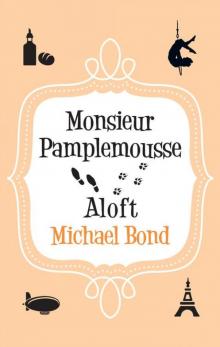 Monsieur Pamplemousse Aloft
Monsieur Pamplemousse Aloft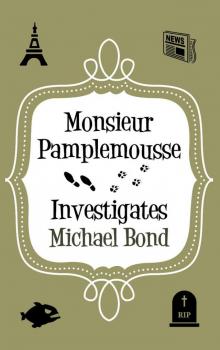 Monsieur Pamplemousse Investigates
Monsieur Pamplemousse Investigates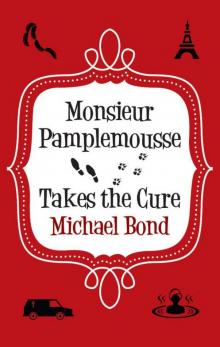 Monsieur Pamplemousse Takes the Cure
Monsieur Pamplemousse Takes the Cure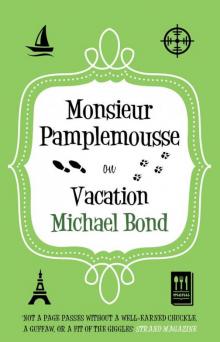 Monsieur Pamplemousse on Vacation
Monsieur Pamplemousse on Vacation Monsieur Pamplemousse on the Spot
Monsieur Pamplemousse on the Spot Monsieur Pamplemousse Hits the Headlines
Monsieur Pamplemousse Hits the Headlines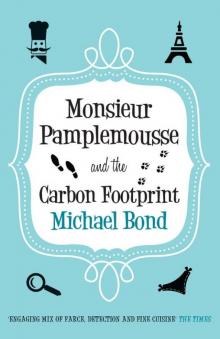 Monsieur Pamplemousse and the Carbon Footprint
Monsieur Pamplemousse and the Carbon Footprint Love from Paddington
Love from Paddington Paddington’s Finest Hour
Paddington’s Finest Hour Paddington Complete Novels
Paddington Complete Novels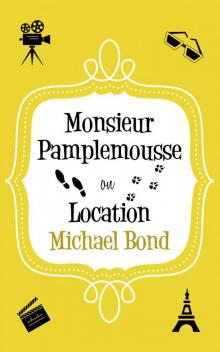 Monsieur Pamplemousse On Location
Monsieur Pamplemousse On Location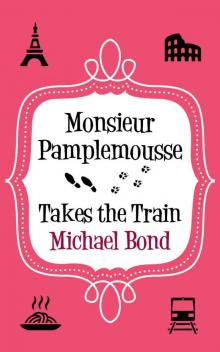 Monsieur Pamplemousse Takes the Train
Monsieur Pamplemousse Takes the Train It Wasn’t Me!
It Wasn’t Me! Paddington Races Ahead
Paddington Races Ahead Monsieur Pamplemousse and the Tangled Web
Monsieur Pamplemousse and the Tangled Web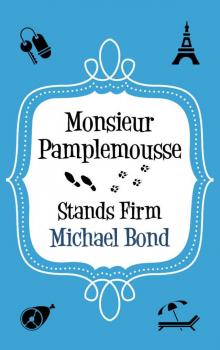 Monsieur Pamplemousse Stands Firm
Monsieur Pamplemousse Stands Firm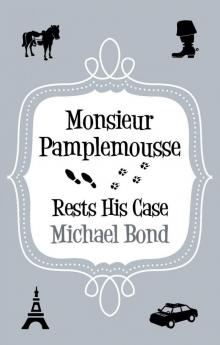 Monsieur Pamplemousse Rests His Case
Monsieur Pamplemousse Rests His Case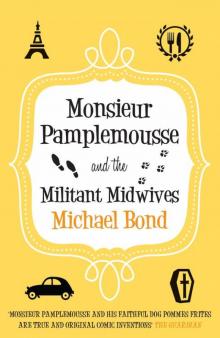 Monsieur Pamplemousse and the Militant Midwives
Monsieur Pamplemousse and the Militant Midwives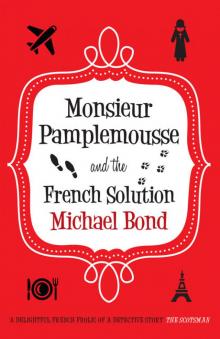 Monsieur Pamplemousse and the French Solution
Monsieur Pamplemousse and the French Solution Paddington Helps Out
Paddington Helps Out Monsieur Pamplemousse & the Secret Mission (Monsieur Pamplemousse Series)
Monsieur Pamplemousse & the Secret Mission (Monsieur Pamplemousse Series)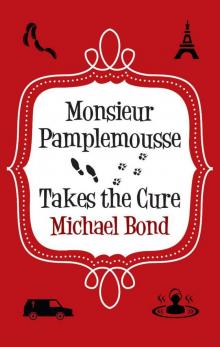 Monsieur Pamplemousse Takes the Cure (Monsieur Pamplemousse Series)
Monsieur Pamplemousse Takes the Cure (Monsieur Pamplemousse Series) A Bear Called Paddington
A Bear Called Paddington